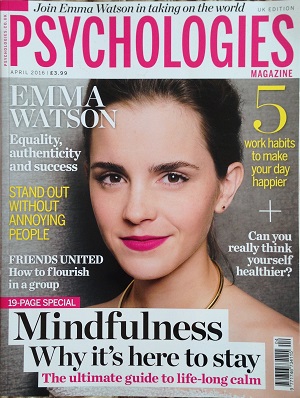Eye-Opening Mental Wellbeing Statistics
Take a look at these mental wellbeing statistics gleaned from our collection of Psychologies magazines which we’ve hoarded over the years. Psychologies is our favourite source of information on mental health and wellbeing and their stats on mental wellbeing are particularly enlightening. Scan through the statistics below and then take a look at our conclusion about what these figures reveal.
Exercise
Scientists have found that it only takes 26 minutes of yoga practice for people to report greater energy levels.
A seminal study by eight public health researchers using one million participants showed you are 75% more likely to develop depression if you do not exercise.
In those who took part in a study by the University of San Francisco, 60% of people with depression saw a significant improvement in the symptoms after practising yoga twice a week. And a study involving 30,000 adults found that just 60 minutes of exercise a week could prevent depression, Nearly half of those were more likely to suffer if they didn’t exercise.
Sleep
In a study of sleep-deprived students, 81% recalled negative words from a presentation while only 31% remembered positive words proving sleep is crucial for optimism.
The average number of restless nights a person experiences over one year is 71, which is roughly six ‘bad sleeps’ a month.
A study by the New York University School of Medicine found that a 30 minute soak, 2 hours before bedtime helps to aid sleep due to the change in body temperature from hot to cool.
Diet
Five cups of green tea a day reduces stress levels by 20% according to the American Journal of Clinical Nutrition.
Researchers at the University of Georgia found that spending 10 minutes walking up and down stairs leaves you more energised than 50 milligrams of caffeine.
Research has found a direct link between eating more fruit and vegetables and increased psychological wellbeing. People who ate three to four daily servings had a 12 per cent lower risk of stress while those who ate five to seven servings had a 14 percent lower risk.
Lifestyle
In a study, 76% of people said they have a go-to song that instantly helps them to feel more positive about life.
In 82% of people surveyed, experiences brought more happiness compared to just 6% who favoured purchases and material goods.
In a study of young people, 86% of them said that dancing lifts their mood and wellbeing and 76% said dancing boosted their aspirations for the future.
In a survey, 85% of people said working on a creative activity such as painting, writing or crafting helped them to de-stress.
In a study, 66% of people said that new travel experiences make them feel content and fulfilled and 79 % of us are happy to give up material goods in order to fund new or unique experiences at home or abroad.
The amount of extra time a week the average person spends on their phone instead of with their partner is an incredible 12 hours.
Research by University of Queensland scientists show that if everyone simply visited their local park just once a week there would be 7% fewer cases of depression and 9% fewer cases of high blood pressure.
99% of people say they feel happier when they are outdoors in the fresh air thanks to the connection with nature.
Around 86% of dog owners say having a dog helps to lower their stress levels by giving them more time outdoors.
Work
On average 53% of people take time to create calm in their lives but nearly all of them found that work was a barrier to this.
In a poll, workers and non-workers showed the same happiness-stress ratio of 4:1. But on weekends the ratio for workers shot to 10:1 but in those who do not work it was only 5:1, suggesting that social time with friends and family boosts wellbeing – and that workers feel its full effects on days off.
So what do these stats reveal then? Well, in order to help your mental health you need to......take up yoga, get a dog, take a walk in the park, take a bath before bed, get off your phone, travel more, buy less, don't work at weekends, spend more time with friends and family, take up a creative hobby, have a boogie every day, pick a happy song, drink five cups of green tea a day, eat seven servings of fruit and veg a day, give up caffeine and run up and down stairs instead.
So that's sorted then? Well, no not really. Because for some of us with mental health issues, just getting out of bed - let alone doing a yoga class or going for a walk in the park - could be the only thing that's accomplished all day. So instead of going hell for leather and trying to do all these things at once, why not try to introduce one of those things every week or every month and see what kind of difference it makes?
For more practical help including free audios, videos, meditations, advice and tip sheets from a senior psychiatric nurse, visit the LightHearts FREE Mental Wellbeing Course. Or go to your local newsagents and pick up the latest copy of Psychologies - it might just be the turning point you need.
GET THE FREE MENTAL FIXITS KINDLE EBOOK...
Download the whole LightHearts UK mental health course for free with Kindle Unlimited. Includes personal stories from the LightHearts founders on how to deal with low self-esteem, eating disorders, depression, anxious thoughts and panic attacks.
Click HERE to go to Amazon and find out how you can download your copy now.






















